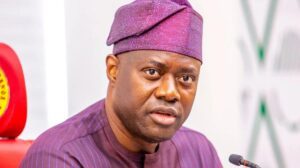Adiyan II Water Plant to supply 70MGD to Lagos – Gov. Sanwo-Olu
Lagos State governor, Babajide Sanwo-Olu on Wednesday said that his adminstration would bridge the gap of the shortage of potable water supply upon the completion of the Adiyan II plant.
Sanwo-Olu made the remark in a message to the 2021 Lagos International Water Conference held in Victoria Island, Lagos.
The theme of the Conference was, “Water Security and Investment Opportunities in Megacities: A Case of Lagos State.”
Sanwo-Olu, who was represented by his Deputy, Dr Obafemi Hamzat, said that the Adiyan II Plant was expected to contribute additional 70 million gallons per day (MGD) to the already existing water capacity.
“The Lagos State Water Supply Master Plan estimates daily water demand in the city at 540 million gallons per day (MGD) but production by the Lagos State Water Corporation (LSWC) stands at 210 MGD.
“This shows a clear deficit of over 300 MGD, which translates to less than 40 per cent access to clean and safe water.
“As a government, we are not oblivious of this gap and its consequences on the health of our populace,’’ Sanwo-Olu said.
He noted that in order to close the gap, they toured the Lagos Water Corporation facilities at Adiyan, Iju and Akute at the inception of his administration.
The governor said that his administration had expended resources on the facilities and were delighted that the plant would bring additional 70 MGD to the already existing water capacity.
“As a demonstration of our commitment to affordable and sustainable clean water supply, we have signed a three-year Memorandum of Understanding with WaterAid on capacity building for improved regulation and expansion of clean water access,” he said.
Sanwo-Olu, however, said there was still the challenge on how to make people less vulnerable to poor sanitation, expand water, and how to maximise the investment opportunities in the water sector.
He noted that because of those challenges, the water conference was integral to shaping the future of water security and waste water management.
“We are propelled by our concern for the well-being of our people to make the water sector economically viable but we will not put economic gains above the health of Lagosians.
“Our water, sanitation, and hygiene efforts in the last two years have been targeted at protecting the overall interest of our people, improving their quality of life while implementing the critical reforms and regulations necessary to optimise financial investments in the water sector,” he said.
The governor said he was confident that just like the 2020 water conference, this edition would help consolidate the government’s achievements in the provision of reliable water supply.
He said it was essential to keep having crucial conversation on how to shape the future of water security particularly because of the state’s strategic position as a megacity.
“With a population of over 22 million people, there is no better time than now to make calculated decisions on what must be done to actualise our goal of an efficient water sector that is complemented with high returns on smart investments,” Sanwo-Olu said.
Also, the Commissioner for Environment and Water Resources, Mr Tunji Bello, said water was indispensable to human existence.
He noted that its security and access to inhabitants of a state like Lagos, with a surging population of over 20 million people and a projected annual growth rate of 3.2 per cent was of critical concern and surely demanded attention.
Bello commended the present administration of Sanwo-Olu for intensifying effort to resolve the issue of water for the benefit of Lagosians.
“Indeed the resolution of the multifarious challenges confronting the water and wastewater management sector in Lagos requires a committed and deliberate approach in delivering the ideals of sustainable development,” Bello said.
Commenting, Water Aid Nigeria Country Director, Evelyn Mars said that access to sustainable and equitable safe drinking water remained a challenge in Nigeria.
She noted that with over 60 million people in the country lacking access to basic water supply, poor drinking water quality compounded the problem.
“Also, our changing climate condition is making life harder for the poorest people who are already struggling to get clean water.
“Going by the current rate of progress, it is clear that Nigeria is off-track and has a long way in meeting the sustainable development goal targets on universal access to water,” Mars said.




